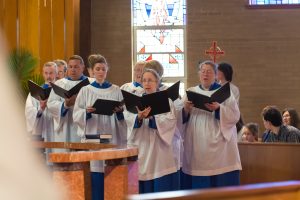By Nathaniel Youndt
When my wife, Meridien, and I started attending CTR, we loved how seriously the music was treated—that it was so much a part of the worship, and well-performed. Not only that, but it was quality music. It probably wasn’t two weeks before Dan McKinley got our email addresses and plan ned our enlistment into his choral ranks.
ned our enlistment into his choral ranks.
I’ve been in choirs since I was a kid, but only been with the CTR Choir for a little over a year now. Even so, learning the ropes when we first
joined was a challenge, esp
ecially since neither of us came from a high liturgical background. Things such as: How do you fall into double-line processions while reading a hymn? When do you wear what robes? How to tackle the beast that is Anglican Chant, and what is a Festal Procession anyway? But we acclimated to these things quickly, and have found the purposes and practice enriching.Good music often serves as an avenue for God to communicate his glory to us. For some people, it is hearing music, and for others it is preparing and presenting that music. It’s no wonder that the Psalms are full of musical references and charges to sing and make music for the Lord. Saul’s anger is appeased by David’s lyrics; Mary’s response to her Immaculate Conception is to produce the poetic song of praise that we call the Magnificat; and the new creatures in John’s Revelation sing new songs before the Lord. The choir is a ministry to the church in this, and I find it important to remember that we are a group in service to the Lord, through the church, in song. After rehearsals and on Sundays before the service, we all pray together: “Bless, O Lord, us Thy servants, who minister in Thy temple. Grant that what we sing with our lips, we may believe in our hearts, and what we believe in our hearts we may show forth in our lives. To Jesus Christ our Lord, Amen.” It’s a reminder that our music is a catalyst for worship, but also something by which we must live.
On the logistical side, we rehearse on Thursday nights from 7:15-9:15pm, with a short break in the middle. And then we arrive at 10am on Sundays for a rehearsal of the music for the 11am service. Aside from these times, the choir is a community of jolly people who do anything from summer cookouts together to superbowl parties, and the occasional night out after rehearsal. It is a vivacious community to be a part of. God gives us all gifts to be used, whether it’s finances, teaching, administration, or task-completion, but sometimes it’s a fine vocal instrument. I’ve found the choir to be one way to offer something to God each week, and if you see yourself serving in the same way, we’d love for you to join us.
I’d be lying if I pretended to never struggle to attend a practice, or that we don’t get tired during the regular services of Holy Week. But we keep singing, because when you start making music with others—practicing pieces over and over again, moving from individuals trying to find their parts, to a chorus that can create a musical moment that rings through the sanctuary—you participate in a narrative of harmony and dissonance, of tension and resolution. We are given music, we stumble through it on a first and second read, we refine it and pray over it, and present it as our offering to the service—like the Eucharist, our music is taken, broken, blessed, and given.

Recent Comments